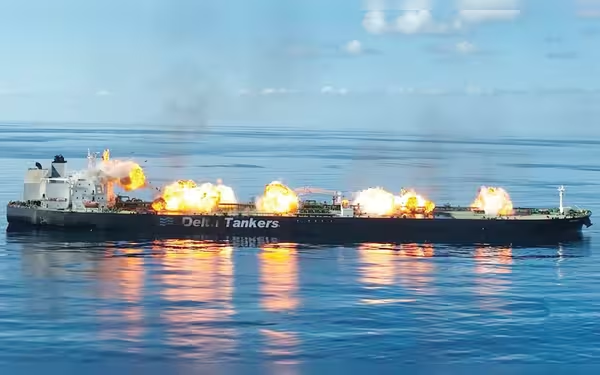Saturday, November 16, 2024 05:54 PM
EU Operation to Salvage Burning Red Sea Oil Tanker Prevents Environmental Disaster
- MV Sounion towed to safety without oil spill.
- Potential ecological disaster averted in Red Sea.
- Houthi attacks threaten global shipping routes.
 Image Credits: arabnewspk
Image Credits: arabnewspkEU-led operation successfully tows burning MV Sounion to safety, averting a potential environmental disaster in the Red Sea.
The ongoing crisis in the Red Sea has drawn international attention, particularly due to the EU-led operation aimed at salvaging the burning oil tanker, MV Sounion. This vessel has been ablaze for nearly a month after being attacked by Yemen’s Iran-backed Houthi militia. The situation poses a significant threat to one of the world’s most delicate marine ecosystems, and the stakes could not be higher.
On August 21, the Greek-flagged MV Sounion was struck by missiles launched by Houthi militants while navigating through a busy shipping lane off the coast of Hodeidah. The tanker was carrying a staggering 150,000 tonnes of crude oil, and the damage it sustained left it at risk of spilling its cargo into the Red Sea. This region is known for its rich biodiversity, including unique coral reefs that are particularly vulnerable to environmental disasters.
After several delays, the salvage mission, known as Operation Aspides, finally commenced on September 14. On Monday, the EU mission announced a significant development: the Sounion had been successfully towed to a safer area without any oil spill. This is a crucial step in preventing what could be one of the worst ecological disasters in history. However, the threat remains until the vessel is safely docked and unloaded.
The initial attack on the Sounion was part of a broader Houthi campaign aimed at disrupting global shipping, which they claim is a show of solidarity with Palestinians amid the ongoing conflict in Gaza. Since October 2023, the Houthis have targeted over 80 vessels in the Red Sea, resulting in the deaths of at least four sailors. In response, the US and UK have conducted strikes against Houthi targets in Yemen, but these actions have not deterred further attacks.
The potential consequences of an oil spill from the Sounion are alarming. Experts warn that it could be four times worse than the infamous 1989 Exxon Valdez disaster, which devastated the Alaskan ecosystem. The Red Sea’s marine life, including its coral reefs, could suffer long-lasting damage, affecting species and habitats for decades. Julien Jreissati, a director at Greenpeace, emphasized that the unique coral species in the Red Sea are under threat, and a spill could lead to contamination spreading across vast areas.
Moreover, the economic implications of a major oil spill would be severe. The Red Sea is a vital shipping route connecting Europe, Asia, and Africa. Disruption to this passage could have ripple effects on global trade. Additionally, contamination could impact desalination plants that provide fresh water to millions in Saudi Arabia, Yemen, and Eritrea. Given the closed nature of the Red Sea, any contamination could linger for an extended period, exacerbating the situation.
The salvage operation itself has faced numerous challenges. The EU’s Aspides mission, established to protect merchant vessels in the region, is leading the effort in collaboration with private sector actors. The crew of the Sounion, consisting of 23 Filipinos and two Russians, was rescued early in the operation and taken to safety. However, attempts to tow the vessel were initially halted due to unsafe conditions.
As the operation progressed, the tanker was towed at a slow pace to a safer location, with specialized teams working under extreme conditions. Reports indicate that the rescue vessel, Aigaion Pelagos, was escorted by frigates equipped for firefighting and oil spill recovery. Despite the challenges, the salvage team managed to secure the tanker, showcasing the complexities involved in such operations.
The situation surrounding the MV Sounion is a stark reminder of the delicate balance between human activities and environmental preservation. The international community must remain vigilant and proactive in addressing the threats posed by such crises. As we navigate these turbulent waters, it is crucial to prioritize the protection of our planet’s ecosystems, ensuring that future generations inherit a world where nature thrives alongside human progress.













